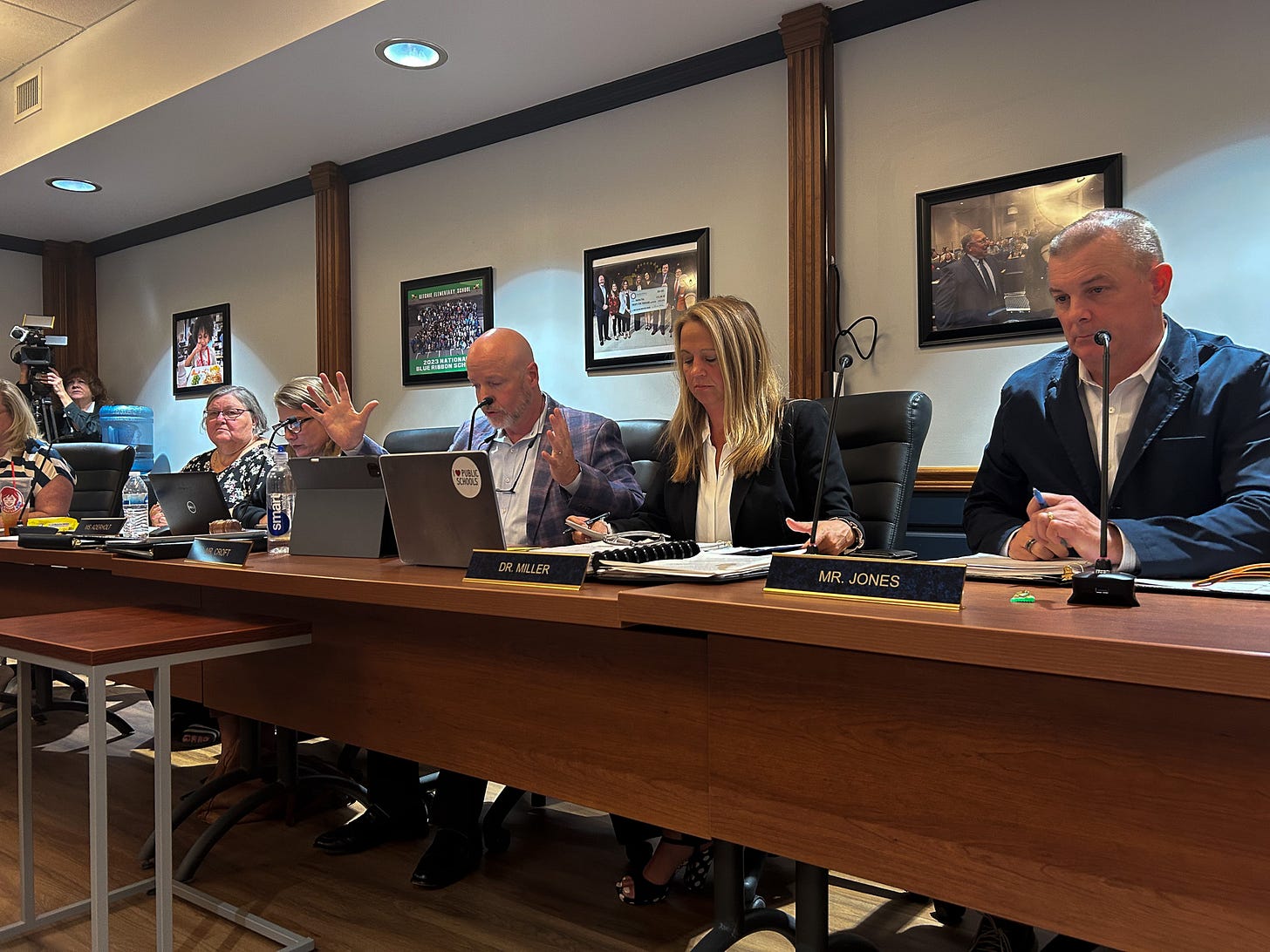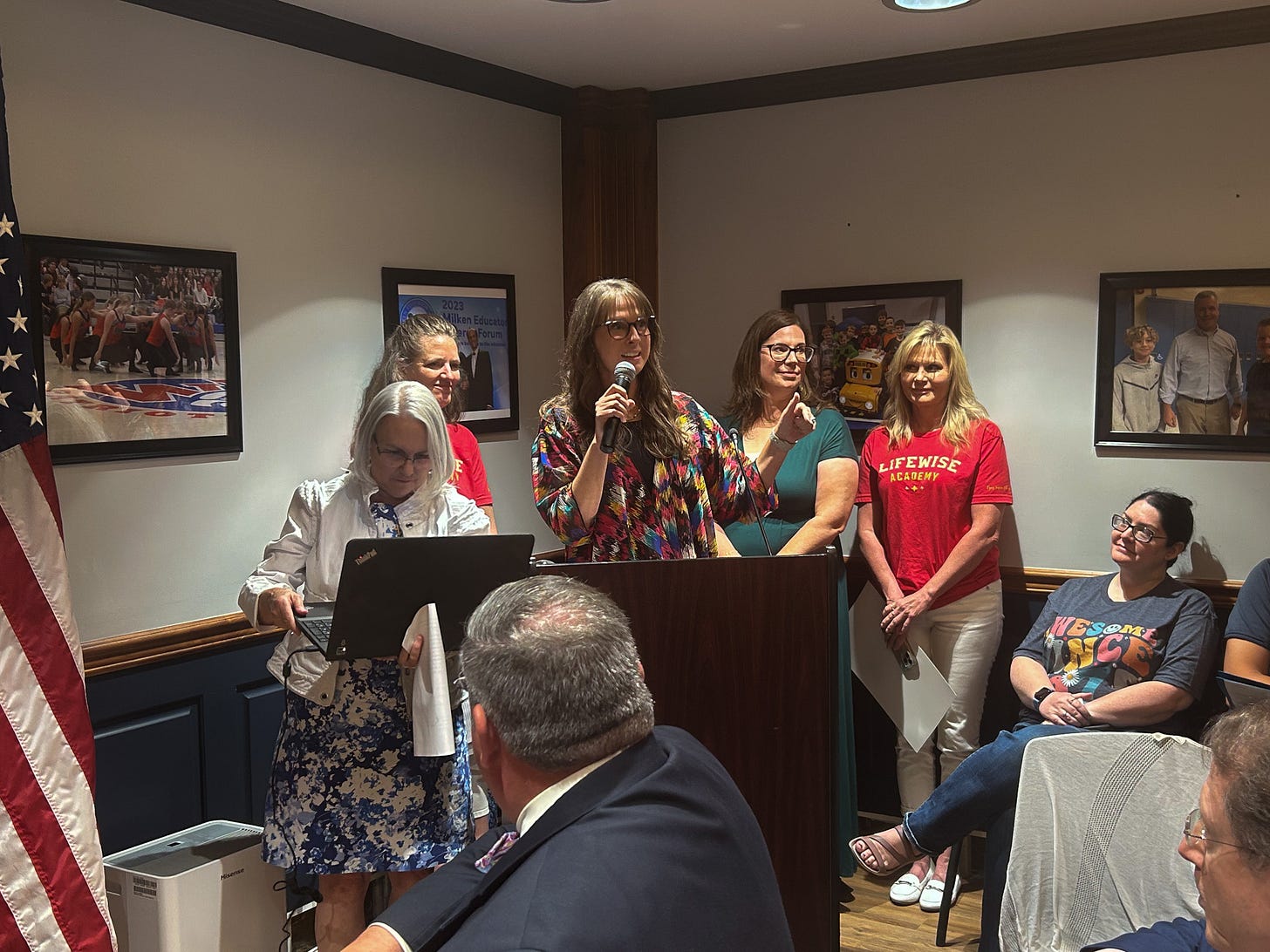Ohio County BOE rejects Lifewise Academy, released time for religious instruction
The Ohio County Board of Education narrowly rejected a Lifewise Academy-sponsored initiative that would have begun the process of instituting released time for religious instruction at county schools.
WHEELING — On Monday, Aug. 25, the Ohio County Board of Education voted to reject a proposal that would have empowered Superintendent of Ohio County Schools Dr. Kim Miller to draft a rule which, if later adopted by the Board, would permit released time for religious instruction at the county’s 13 schools.

While supporters argued that the released time for religious instruction would not intrude on student’s time in the classroom, opponents argued the program would be disruptive and possibly alienate students whose families choose not to participate.
Ultimately, after hours of debate, just two Board members — Molly Aderholt and Bernie Albertini — voted to support moving forward with the program.
What is released time for religious instruction?
Released time for religious instruction, or RTRI, is a program that allows public school districts to excuse students, with a guardian’s written permission, from part of the school day to allow them to attend religious classes off campus. Programs vary by school district in the amount of time a student is off campus and the type of religious instruction offered.
One objection opponents have to RTRI is that they believe it violates the constitution’s Establishment Clause, which requires the separation of church and state. In the 1950s, parents in New York City made that same argument against their school board’s released time for religious instruction programs.
In 1952, that case — Zorach v. Clauson — came before the Supreme Court of the United States where the justices decided 6-to-3 that RTRI programs did not violate the constitution because they were voluntary, received no public funds, and classes were held off of public school campuses.
Laws regarding RTRI vary from state-to-state. W. Va. Code §18-8-1(j) gives sole authority of approving requests for released time for religious instruction to school boards.
Who’s behind the push for RTRI in Ohio County?
Lifewise Academy, an Ohio-based nonprofit religious institution, has made headlines across the nation as it seeks to expand its standardized RTRI program. The organization describes itself as “unapologetically, unswervingly gospel centered” and teaches students to be “ambassadors for the king of the universe.”
At the time of reporting, Lifewise Academy operates in over 600 public school districts across 30 states.
In a video posted to the organization’s website, Lifewise Academy is described as a “plug-and-play” program that provides “bible education to public school students during school hours.” The organization relies on parents of school districts and host churches in the area to advocate for and host an RTRI program, while Lifewise Academy assists in funding the construction or renovation of spaces, acquiring religious educational materials, and paying teachers.
While programs vary across partnering school districts in design, length of time out of the classroom, and number of days per week, most models see students leave public school campus for roughly one hour per day during “specials classes” like art, music, gym, independent study, or library time. Other school districts release students during their lunch period, as was being proposed for Ohio County.
Lifewise Academy has received millions of dollars from The Heritage Foundation, a right-wing think tank based in Washington, D.C. The Heritage Foundation has played a significant role in shaping current-day conservative politics, including its lead role in crafting Project 2025, a plan that advocates for appointing ideologically aligned civil servants, restricting access to abortion, and opposing LGBTQ+ rights, among other issues.
How the community reacted…
Over 20 people signed up to address the Board as they considered allowing RTRI programs at Ohio County Schools; however, community members were made to wait until the end of the meeting — and after the vote — to present their arguments for or against the initiative.
Before the vote, one member of the local Lifewise Academy steering committee and two religious leaders in the area spoke.

Wheeling Middle School teacher Trisha Cronin, representing Lifewise Academy, spoke in favor of released time for religious instruction. She said she was “delighted” when she learned that over 300 people from Ohio County had allegedly signed a petition in support of RTRI.
“There are many positive impacts to implementing Lifewise,” Cronin said. She claimed a “national consulting firm” observed a 7% increase in school attendance for schools that had Lifewise Academy programs. “Program directors report that students rarely miss the day that Lifewise takes place because it is their favorite day of the week.”
Rabbi Joshua Lief, who leads the congregation at Temple Shalom in Wheeling, rose in opposition of the program. Lief argued that there are many ways for the faith community to support their neighborhood schools, but queried if it was necessary to pull children from schools to further that support.
“I agree wholeheartedly with those who made the presentation [about Lifewise Academy] that faith is worthwhile, and inspiring our children is crucial,” Lief said. “I am very concerned, however, particularly from a religious minority, we are not a homogenous community…there, at minimum, would be a division between those who left and came back and those who hadn’t left.”
Board members speak out…
For the Board’s part, members were themselves divided on support for RTRI.
Molly Aderholt, who has served on the Board for eight years, said it was “unfortunate to see…misinformation online” as a result of the RTRI discussion, clarifying that no public funds would be spent on the program. Aderholt further argued that the debate centered on RTRI, not Lifewise Academy specifically; and, in her view, a trial run for released time for religious instruction in the county would be worthwhile.
Anne Hercules, one of the newest members of the Board, spoke of her time at the public school in Warwood. While there, Hercules recalled times when she and other classmates would, during the school day, walk to the nearby Corpus Christi Parish for religious instruction. “I don’t feel that school time is a time to do this,” Hercules argued. “It’s very disruptive.”
Superintendent Miller weighed in on the debate despite not having a vote on the Board. In her statement, Miller said she “[respects] all of our parent’s rights and what our parents do,” but argued her main job was academic accountability and the health and wellbeing of students. She argued that the time outside of the classroom could negatively impact teacher’s ability to meet classroom standards as leaving and returning to class can be disruptive.
Where we go from here…
While opponents of Lifewise Academy and RTRI may take Monday’s vote as a win, it’s unclear how long-lasting their victory will be.
For one, the Supreme Court has declared released time for religious instruction constitutional, and state law allows parents to request RTRI from their school boards. Lifewise Academy, another organization or church, or a group of parents could again file with the Board to revisit the issue.
Secondly, the state Legislature and its Republican supermajority could easily change state law mandating RTRI in each district. In fact, Republican Sen. Patricia Rucker, who represents the state’s 16th Senatorial district, introduced a bill during the 2025 session that would have done just that. The proposed bill, if adopted and signed into law, would have compelled each district to adopt released time for religious instruction allowing students to leave campus for up to five hours per week.
While the bill ultimately died in committee, it could be brought back next year. And, with Gov. Patrick Morrisey’s propensity to challenge state and county boards of education in the name of “religious freedom,” the bill could see better traction than it had in 2025.
Freelance journalist Niamh Coomey assisted in the making of this story by attending the Board meeting in person, as well as taking notes and photographing the event.


🎯Track LifeWise infiltrating public schools near you on the interactive RespectPublicSchools.com map: